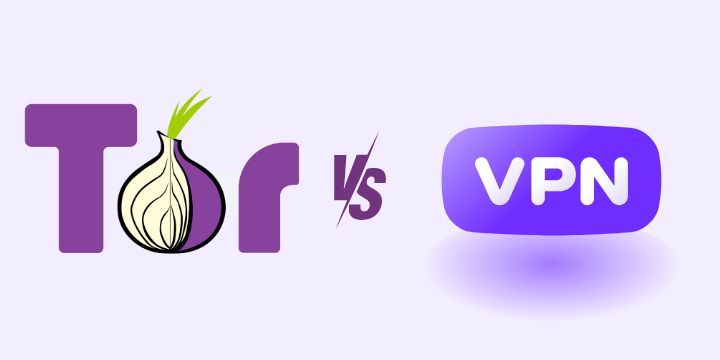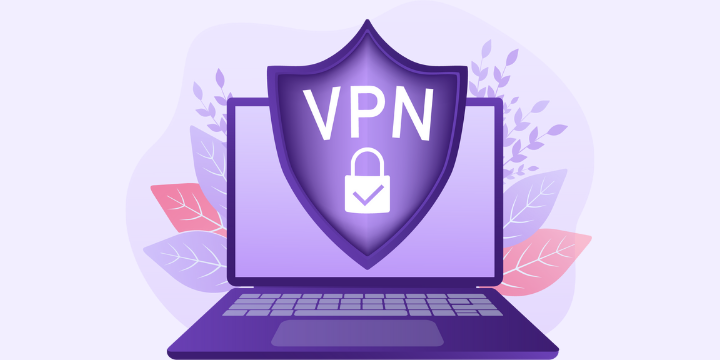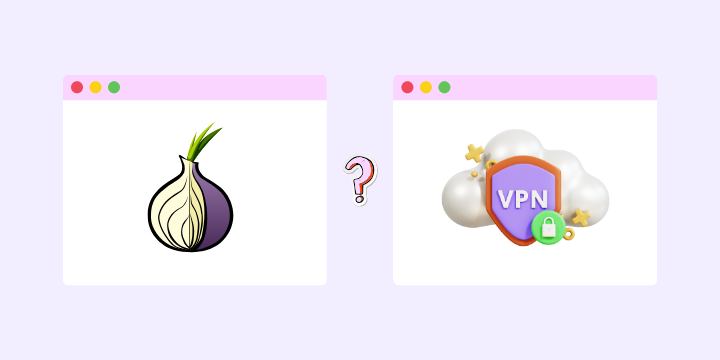It goes without saying that companies, advertisers, and cybercriminals pay close attention to your online activities and browsing. They want to target you with ads to sell you the best goods. From one side it helps you to improve user experience, from another – it is very annoying.
Privacy tools like Tor and a VPN can help with that. They both provide strong encryption and keep your online activities hidden from third parties listed above. We’ll explore the differences between Tor and VPNs in this article, and their features.

What is the Tor network?
Tor is an open network that can only be used within its browser. Tor routes your internet traffic through relays and servers called a chain of nodes. Tor hides your real IP address, data, and browsing activity from ISPs and snoopers.
Benefits of Using Tor
- Access to .onion sites and the Dark Web: Tor gives you access to “.onion” sites and the dark web.
These websites host content that is not available on the typical website, for example, specialty outlets, forums that offer paid access to academic research, and forums on controversial topics profile.
- Multilayer encryption: Tor uses a three-step relay system with random servers: an ingress node, a relay node, and an egress node.
However, the exit node doesn’t encrypt the traffic, leaving the data insecure when it leaves Tor. The VPN solves this by encrypting the data at the exit node as well.
- Decentralized server network: Tor operates without centralized authority. It does not keep records. The Tor community keeps the network secure, preventing higher authorities from accessing or monitoring data.
- Free to use: Tor is free on any device and allows users to enjoy its privacy and anonymity for free.
Cons of Using Tor Network
- Issues with speed: Working with Tor reduces your Internet speed
- Not for torrenting: Tor is not designed for torrenting.
- Tor is blocked by some websites: Some websites may block access from Tor exit nodes.

What is a VPN?
A VPN, or Virtual Private Network, is a service that establishes a secure, encrypted connection between the user’s device and a server operated by the VPN provider.
This connection masks the user’s IP address and encrypts the exchanged data, creating a protected tunnel for online activities.
Pros of Using a VPN
- Access to Geo-Restricted Content: VPNs enable access to some kind of content unavailable in the physical location of the user.
- Prevents Bandwidth Throttling: A VPN masks the nature of your online activities from your ISP. Internet service providers may slow down your internet speed.
- VPNs are compatible with various devices: Use VPN with computers, smartphones, and tablets across different platforms.
- VPN provides safety for online transactions: your banking details or personal credentials are safe with a VPN!
Cons of Using a VPN
- Trust in VPN Providers: Users need to place their trust in their selected VPN provider since all internet traffic passes through their servers.
- Difficult to Choose a Reliable Provider: Among the many VPN services available, it is a challenge to select a reliable and trustworthy provider.
- Limited Free Server Options: Planet VPN offers 5 locations in the free version, while the paid version provides access to over 60.

Comparison of Tor and VPN
Anonymity
- Tor has a multi-level routing system. Each relay adds extra encryption. In contrast, VPNs use one-hop encryption that provides less anonymity compared to Tor
- Speed and Performance: The truth is that both VPN and Tor slow down your Internet speed but both give you a secure online environment.
- Legal and Ethical Considerations: Tor and VPN are legal tools designed to help us stay safe online. Be aware of the legal implications and don’t use these tools if you are doing any unlawful activities.

Useful tips for choosing Tor and VPN
- Look at your needs: choose your priorities, what you prefer, full anonymity, speed, and access to content worldwide.
- Consider speed: If speed is important for activities like streaming or gaming, a VPN might be more appropriate.
- Check the reliability of the provider: Look for reputable VPN providers, and consider their privacy policies and records.
- Improved security: Some users choose Tor over VPN for added protection.
- Legal Considerations: Understand the legal implications in your state and ensure compliance.
>> You may ask: Are VPNs Legal?
In conclusion, the choice between Tor and VPN depends on your specific needs and preferences.
Tor encrypts data three times and relays it through random nodes for strong anonymity. VPN encrypts data and routes it through servers, offering a practical solution for everyday internet use.
If you prioritize daily browsing, go for a VPN. For maximum privacy, you can use a VPN and Tor together, but be aware that this will slow down your internet speed significantly.
Follow the practical tips from this guide to understand the difference between Tor and VPN to improve your online privacy and security.
-
Is Tor better than VPN?
It depends on what you need. Tor is better for anonymity, while a VPN is better for speed, security, and accessing restricted content.
-
Is it better to use Tor without VPN?
Yes, using Tor alone is usually better. Adding a VPN can slow it down and may not improve privacy.
-
Can Tor be tracked?
Tor hides your identity, but it’s not 100% untraceable. If you visit unsafe sites, you could be tracked. Using a VPN before connecting to Tor adds an extra layer of protection and helps hide your real IP address.
-
Is it legal to use Tor?
Yes, Tor is legal in most countries. However, some governments restrict or monitor its use.
-
Is there a vpn like tor?
Planet VPN does not work exactly like Tor, but it provides strong encryption and anonymity features.
While Tor routes traffic through multiple volunteer nodes for extra privacy, Planet VPN secures your connection by encrypting your data and masking your IP address. If you need a simple and secure way to stay private online, Planet VPN is a great choice.